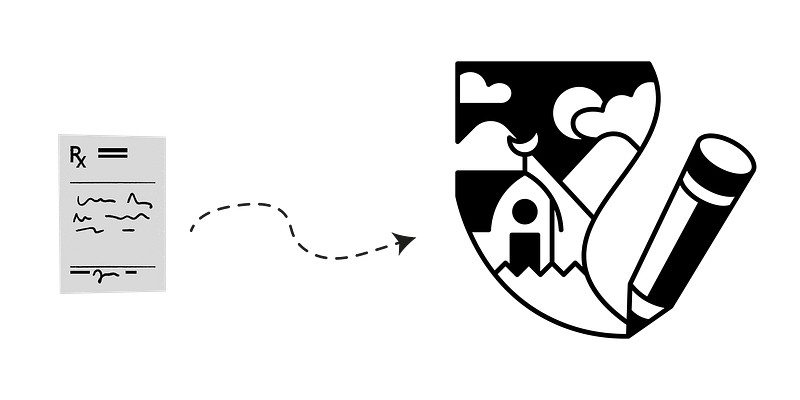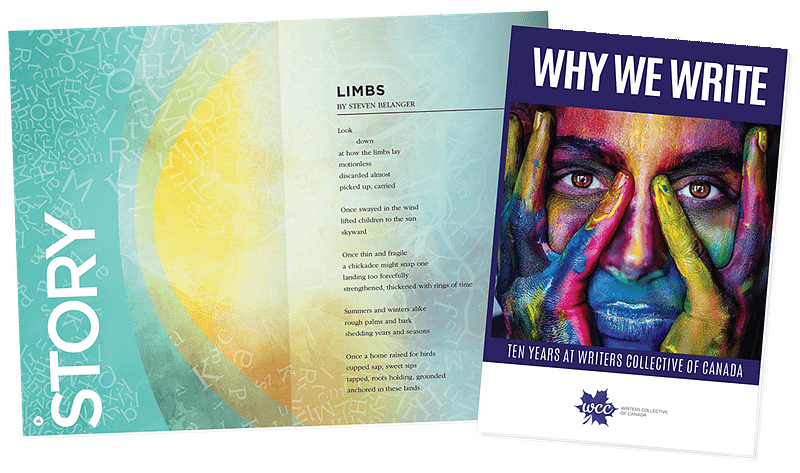
In 2013, a group of unhoused men and women gathered in Writers Collective of Canada’s (WCC) first writing workshop at Toronto’s toughest drop-in shelter.
“I bet you have stories to tell,” WCC founder, Susan Turk Mozer prompted.
“Nobody has stories like we do!” they replied.
The group wrote together—first tentatively then more assuredly. Many of the participants shared what they had just written and were stunned by the power of their voice. Stories were told for the first time and were affirmed by supportive feedback. The impact on each writer, within and outside of the workshops, was—and still is—profound.
Rather than focusing on craft or final product, WCC workshops emphasize the many benefits associated with the process of writing in community, sharing that writing, and feeling deeply heard—all while finding connection with self and others. The word most commonly used to describe the transformation we witness in our writers is, “magic”.
But there is no funding available for magic. So, from its early years, WCC has learned how to measure the impact of the magic our program creates.

The art of measuring impact
There are many ways that we can (and do) measure our program that will be familiar to other non-profit and charitable organizations; for example, we report on the number of:
- Opportunities provided – WCC currently hosts between 20-30 workshops a week—online, onsite, or a hybrid model of both.
- Individuals served – to date, we have delivered workshops to more than 8,000 writers across more than 35,000 individual workshop experiences.
- Partnerships formed – the majority of our weekly workshops are offered in partnership with one of the nearly 130 social-service, community, health, and arts organizations across the country whom we partner with.
- Volunteers trained – to date, we have trained more than 330 volunteer facilitators, many from the communities we serve.
- Communities reached, including Indigenous peoples, immigrants, refugees, the homeless and underhoused, abused women, youth, seniors, caregivers, veterans, first responders, members of the 2SLGBTQIA+ community, and many others.
However, it is through a collaboration with Dr. Kelly McShane and her team at Toronto Metropolitan University (TMU, formerly Ryerson University) that we learned to measure what our impact is and how we achieve it. Dr. McShane gave us words to articulate the power of our program; through evaluation, she helped us translate what we were experiencing into a language we can share with allies and skeptics alike. Together, we found clarity, credibility, and confidence that continues to evolve and strengthen the more we use the language.

Staying curious: embedding evaluation into our program
Evaluation is a tool by which we come to understand ourselves. Embedding evaluation and research into our organization’s program and operations fosters a culture of curiosity and a team environment that is less fearful of experimentation. We are more resilient as a result. Working with our partners to better understand the impact of the work we are jointly invested in strengthens these relationships and helps forge new ones. Evaluation is a way to ask big questions, discover surprising answers, and inspire action in ourselves and others.
While we have come to appreciate these many benefits over seven years of work with Dr. McShane, our earliest motives for program evaluation stemmed from necessity more than aspiration. Like so many grassroots arts organizations looking to find sustainable funding, measurement was a means to an end. As much as we could witness and attest to the impact of our program in the lives of individuals—to the transformation that occurred regularly in our workshop participants—we needed to measure and articulate our social value in a way that partners, stakeholders, and funders would grasp and respond to.

Game changer: learning what and how to measure
Our Pilot Study with Dr. McShane launched in 2017 and employed both quantitative and qualitative measures in what soon became a longitudinal evaluation. Over five years, it confirmed that both WCC writers and facilitators experienced positive benefits through participating in our programs. They weren’t only developing literacy skills, honing craft, and publishing stories (although those things happened, too), they were also discovering a new sense of community, increased communication, creativity, confidence, and leadership.
For the first time, we understood precisely what the people we served were benefiting from. WCC writers were accessing courage, resilience, hope, and an empowered identity through writing in community; WCC facilitators were finding a sense of purpose when leading workshops, providing human and creative connection, modeling deep listening, and honouring authentic voice.
Being able to confidently communicate the benefits of our workshops was a game-changer when meeting with prospective partners and funders. Understanding the benefits our facilitators gain by leading workshops changed how we recruit volunteers. That pilot evaluation also brought unexpected discoveries. Many of those who came to us first to write later became WCC facilitators. This was exciting to learn for two reasons:
- Our program was creating a cycle of growth for our participants
- Our roster of volunteers was rich, with a vast range of lived experience. This wealth of untapped knowledge and connections, once discovered, allowed us to more powerfully connect with our partners and populations.

Resilience in the face of a pandemic
As an organization committed to serving those most isolated, a global pandemic and subsequent lockdown presented a unique challenge—namely, to redefine how we understood isolation and also how we could continue our work.
While our team went about learning how to use Zoom, we also reached out to Dr. McShane and her team to begin a new evaluation—this time, an Implementation Study to see how this forced change in program delivery would impact the effectiveness of our program. While our workshop method had been honed over several years in some of the most complex social environments, we had no experience working in the virtual sphere. Dr. McShane’s team made discoveries that helped us feel confident WCC had a role to play in maintaining connection during a time of social isolation, as well as in building resilient communities in the aftermath of the pandemic.

Strengthening relationships and forging new ones
Subsequent evaluations have helped WCC more deeply understand how we meet the specific needs of diverse communities. Through Project Evaluations with Dr. McShane, we have discovered how our workshops empower specific populations, including:
- Caregivers during the pandemic—by strengthening their voices on the page, these writers became stronger advocates for their loved ones left vulnerable inside long-term care homes.
- Homeless veterans grappling with PTSD—our workshops increased healthy new community connection, validated traumatic experience, rebalanced power, increased tolerance, and became an accessible first step in healing.
- Early Psychosis Intervention patients and staff within a hospital setting—here, our workshops increased patients’ therapeutic gains and participation in other programs. Additionally, the workshops helped prevent secondary trauma in staff, reinforced understanding of patients as people, and humanized the clinical setting which led to greater patient-staff collaboration.
For these project evaluations, Dr. McShane leveraged surveys and outcome harvesting and we discovered our program’s potential as a social prescription—something not previously on our radar that has motivated us to explore collaborations with other healthcare providers.

Inspiring action in ourselves and others
We believe our evaluative work supports a larger case for investment in arts-based programs for traditionally underserved and underheard populations. It demonstrates the impact and importance of the arts-health sector in supporting and empowering healthy communities. WCC’s program illuminates the stories we need to hear from the voices we often do not; our research and evaluation builds a strong case for supporting these populations through innovative arts programming with proven impact.
Every evaluation we have undertaken has led to a new discovery and increased our curiosity. After Dr. McShane’s research revealed the broad impact of our workshops regardless of population served, we were inspired to dissect our program theory (known in our workshops as WCC’s Six Essential Practices) to gain a new level of understanding of the ‘how’ of what we do every day. Our program theory is our special ‘recipe’ and being able to share it with our partners and volunteers ensures that all stakeholders are equally invested in protecting the integrity of the program. In fact, we have recently shared our Six Essential Practices in a chapbook titled Why We Write that explains the reasons why these practices are essential.
Engaging our broader community in the findings of our evaluations and research requires more than sending a report. We must also present our learnings in a manner that is accessible and meaningful to our stakeholders. We do this through enrichment sessions for our volunteers, impact storytelling in our outreach, and visual representations of our learning that can be easily shared with and consumed by the public.
While our initial motivations for program evaluation were to meet the needs of funders and other key stakeholders, we think differently now. Increasingly, we ask the questions that we want to answer.
Empowered by the findings of the research and evaluation to date, we now target our evaluation activities to gather insight that will support our growth and sustainability. This enables us to actively seek collaborations with funders who want to be partners in what matters most to us and the populations we serve.
Knowledge acquisition is now part of our strategic planning. We regularly ask the question, “what do we want to know now?” and maintain regular touchpoints with Dr. McShane to ensure she stays apprised of the life of our organization and can work alongside us to identify unique opportunities for learning. Knowledge transfer is part of our culture and we actively seek opportunities to share our learnings with others through conferences, panels, articles, blogs, and roundtable conversations.
At this critical moment when isolation and loneliness are at an unprecedented high and our strained health care system is overwhelmed with demand, our organization’s clear understanding of where and how we can serve is more critical than ever. For every “how can we?” that comes our way, we draw on an archive of how we’ve done it before and the knowledge of what measurable impact we have had. The cycle of curiosity continues.
Read more about the Proven Impacts of our work: https://www.wcc-cec.org/wcc-proven-impact-studies/


